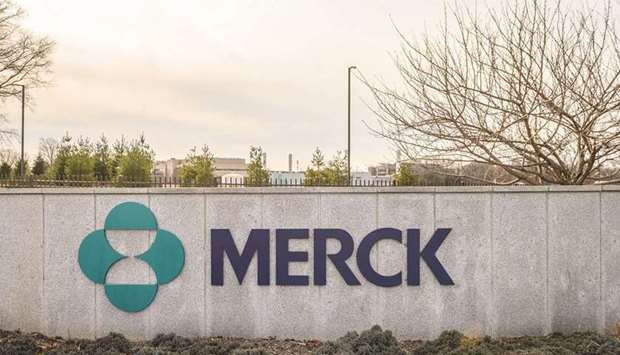Merck & Co shares posted their biggest gain in 12 years after the company’s experimental pill slashed the risk of getting seriously ill or dying from Covid-19 in a study, findings that could eventually yield a simple way to treat many virus patients before they ever reach the hospital.
The drug, known as molnupiravir, reduced the risk of hospitalisation or death by 50% in an interim analysis of a late-stage clinical trial, Merck and partner Ridgeback Biotherapeutics LP said in a statement yesterday.
The study results were so encouraging that Merck and closely held Ridgeback, in consultation with independent trial monitors and the US Food and Drug Administration, elected to stop enrolling patients and begin the process of gaining regulatory clearance. “We couldn’t be more thrilled with the results,” Merck Chief Executive Officer Rob Davis said in an interview. “You don’t have to go to the hospital, you don’t have to go to a centre to have it infused. It’s a pill you can take at home.”
Merck rose as much as 12% in New York trading, its biggest intraday gain since March 13, 2009.
The companies now plan to seek an emergency-use authorisation from the FDA as quickly as possible, Davis said.
If the medication reaches the market, it would mark an important milestone in the pandemic. While there are several drugs available to treat Covid-19, they can be either cumbersome to give to patients, or intended for use in only the most seriously ill.
So far, no easy-to-use option has been available for people who are infected but not yet sick enough to need hospital care. That has left many caregivers with a difficult choice: send infected people home to try to ride out their illness and risk getting worse, or admit more patients to what are often already-crowded intensive-care units.
Monoclonal antibody therapies made by companies including Eli Lilly & Co, Regeneron Pharmaceuticals Inc., and GlaxoSmithKline Plc and partner Vir Biotechnology Inc have been cleared by the FDA to treat mild to moderate Covid-19. While the drugs have been in increasing demand in many states, they require an infusion, which can add to the strain on health systems.
Other medications are used to treat much sicker patients. Gilead Sciences Inc’s remdesivir was one of the earliest therapies to get an FDA authorisation, but it is meant for the hospitalised. And the low-cost steroid dexamethasone, while very effective, is usually only used in the most gravely ill.
Health officials in the US have consistently emphasized vaccines as the primary tool for fighting the pandemic, and so far, more than 75% of eligible Americans have received at least one dose.
However, that still leaves millions more who are vulnerable to infection, and the recent wave of illness spurred by the spread of the delta variant has placed a significant burden on hospitals in areas with lower immunisation rates.
Molnupiravir would give doctors an option to keep infected patients out of emergency rooms. It is intended for use in nonhospitalised Covid-19 patients who have had symptoms for five or fewer days and are at risk for a severe infection. It is in a class of drugs called nucleoside analogues that target the virus’s reproductive mechanism.
Merck and Ridgeback’s findings came out of a previously planned analysis of 775 patients who had been in the clinical trial since at least early August.
The companies said 7.3% of patients who received molnupiravir were either hospitalised or died through 29 days, compared with 14.1% who received a placebo. Through 29 days, none of the participants taking molnupiravir died, compared with eight deaths in the placebo group.
The trial had planned to enrol 1,550 participants, and around 90% had already signed up. Patients who were taking a placebo will have the opportunity to start on molnupiravir, Davis said.
Merck plans to submit the data to other regulators worldwide. It said in the statement that it expects to produce 10mn courses of treatment by year-end, with more expected in 2022.

A signage is seen outside the headquarters of Merck & Co in Kenilworth, New Jersey. Merck shares posted their biggest gain in 12 years after the company’s experimental pill slashed the risk of getting seriously ill or dying from Covid-19 in a study, findings that could eventually yield a simple way to treat many virus patients before they ever reach the hospital.
